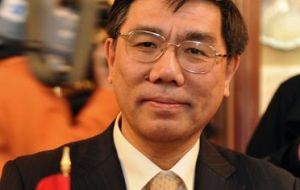MercoPress. South Atlantic News Agency
Top banker predicts speculative inflows will continue; China’s stats not so rosy
 Jiang Jianqing, chairman of Industrial & Commercial Bank of China Ltd at the Boao forum
Jiang Jianqing, chairman of Industrial & Commercial Bank of China Ltd at the Boao forum Speculative money continues to flow into emerging markets, including China, and the situation is likely to continue over the long term, a top executive of China's largest commercial bank said Friday.
“Hot money is flowing into the emerging markets and countries because of their rapid economic growth and the potential for appreciation of their currencies” Jiang Jianqing, chairman of Industrial & Commercial Bank of China Ltd. said at the Boao Forum, an annual gathering of government and business leaders on the southern Chinese island of Hainan.
According to data from China's foreign-exchange regulator, hot money inflows into China totaled 35.5 billion USD last year, accounting for 7.6% of the total increase in the country's foreign reserves during the period.
“Though the proportion is not big, it's still worth attention because of China's ballooning foreign reserves,” said Jiang, who is also a member of the Chinese central bank's monetary policy committee.
China's forex reserves--at 3.0447 trillion USD at the end of March, up 197.4 billion from the end of last year--are the world's largest.
According to the China’s Administration of Foreign Exchange, hot money inflows totaled 29.1 billion USD in 2009, and SAFE estimates speculative money inflows totaled 25 billion USD a year on average over the last 10 years.
“As far as we know, a large amount of hot money has flowed into China's property market, contributing to the formation of a frothy property market in some cities and areas,” Jiang said.
He called for closer cooperation between different government’s bodies such as the commerce ministry, the customs department and financial regulators in monitoring speculative fund flows. Hot money inflows complicate the government's anti-inflation efforts by adding to the supply of liquidity and putting upward pressure on asset prices.
China's statistics bureau said Friday the country's consumer price index rose 5.4% in March from a year earlier, accelerating from a 4.9% rise in February. Data also showed the country's GDP rose 9.7% from a year earlier in the first quarter, down marginally from a 9.8% expansion in the fourth quarter of 2010.
Jiang said he believes China's macroeconomic policies will help it meet its economic growth and inflation targets this year. Beijing is aiming for growth of around 8% this year and to keep inflation around 4%.
China has taken a number of measures to control inflation and cool economy, including four interest rate increases and nine hikes in the proportion of deposits banks must hold in reserve since the start of last year.
Meanwhile, Jiang said ICBC is aiming to take back at least 20% of its loans to local governments in the next three years.
Analysts have said local government financing vehicles and the property market pose the biggest risk to Chinese banks. Although local governments in China are prohibited from borrowing from banks directly, they often circumvent the law by setting up companies to obtain bank loans.
Supported by land holdings and the promises of officials, such firms found plenty of obliging banks as they stepped up lending over the past two years. Outstanding loans to local-government financing platforms totaled CNY7.66 trillion ($1.1 trillion) at the end of June, the China Securities Journal reported in July, adding about 20% of these loans were at a higher risk of default because of lack of sufficient guarantees or cash flows.
Jiang said ICBC's nonperforming loan ratio for loans to local government financial platforms is 0.3%, well below the 1.08% ratio for all loans.




Top Comments
Disclaimer & comment rulesCommenting for this story is now closed.
If you have a Facebook account, become a fan and comment on our Facebook Page!